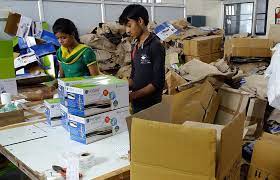Free Packing Executive Course (4Months)
Packing Executive:
Brief Job Description
Also known as Packing Assistant or Packing executive. Individuals at this job need to safely pack and unpack different parts and assemblies according to production and shipping schedules.
Personal Attributes
This job requires the individual to coordinate with assembly line shop floor for timely availability of parts. The individual should also be able to demonstrate skills for information ordering, analytical reasoning and clarity of thought, oral expression and comprehension.

Maintain a safe and healthy working environment:
Scope
The role holder will be responsible for identifying and reporting of risks
creating and sustaining a safe, clean and environment friendly work place This NOS will be applicable to all Automotive sector manufacturing job roles
Elements and Performance Criteria
Identify and report the risks identified
To be competent, the user/individual on the job must be able to:
PC1.. Identify activities which can cause potential injury through sharp objects, burns, fall, electricity, gas leakages, radiation, poisonous fumes, chemicals ,loud noise
PC2. Inform the concerned authorities about the potential risks identified in the processes, workplace area/ layout, materials used etc
PC3. Inform the concerned authorities about machine breakdowns, damages which can potentially harm man/ machine during operations
PC4. Create awareness amongst other by sharing information on the identified risks
Create and sustain a Safe, clean and environment friendly work place
To be competent, the user/individual on the job must be able to:
PC5.. Follow the instructions given on the equipment manual describing the operating process of the equipments
PC6.. Follow the Safety, Health and Environment related practices developed by the organization
PC7. Operate the machine using the recommended Personal Protective Equipments (PPE)
PC8. . Maintain a clean and safe working environment near the work place and ensure there is no spillage of chemicals, production waste, oil, solvents etc
PC9. Maintain high standards of personal hygiene at the work place
PC10. Ensure that the waste disposal is done in the designated area and manner as per organization SOP.
PC11. Inform appropriately the medical officer/ HR in case of self or an employees illness of contagious nature so that preventive actions can be planned for others
Knowledge and Understanding (KU)
The individual on the job needs to know and understand:
KU1. relevant standards, procedures and policies related to Health, Safety and Environment followed in the company
KU2. basic knowledge of Safety procedures( fire fighting, first aid) within the organization
KU3. knowledge of various types of PPEs and their usage
KU4. basic knowledge of risks/hazards associated with each occupation in the organization
KU5. how to safely operate various tools and machines and risksassociated with the tools/ equipment
KU6. knowledge of personal hygiene and how an individual an contribute towards creating a highly safe and clean working environment
Generic Skills (GS)
User/individual on the job needs to know how to:
GS1. write basic level notes and observations
GS2. read safety instructions put up across the plant premises
GS3. read safety precautions mentioned in equipment manuals and panels to understand the potential risks associated
GS4. effectively communicate information to team members
GS5. informemployees in the plant and concerned functions about events, incidents & potential risks observed related to Safety, Health and Environment.
GS6. question operator/ supervisor in order to understand the safety related issues
GS7. attentively listen with full attention and comprehend the information given by the speaker during safety drills and training programs
GS8. use common sense and make judgments during day to day basis
GS9. use reasoning skills to identify and resolve basic problems
GS10. use common sense and make judgments during day to day basis
GS11. use reasoning skills to identify and resolve basic problems

Maintain 5S at the work premises:
Scope
The individual needs to. Ensure sorting, streamlining & organizing, storage and documentation, cleaning, standardization and sustenance across the plant and office premises of the organization
Elements and Performance Criteria
Ensure sorting
To be competent, the user/individual on the job must be able to:
PC1.. follow the sorting process and check that the tools, fixtures & jigs that are lying on workstations are the ones in use and unnecessary items are not cluttering the workbenches or work surfaces.
PC2.. ensure segregation of waste in hazardous/ non hazardous waste as per the sorting work instructions
PC3.. follow the technique of waste disposal and waste storage in the proper bins as per sop
PC4.. segregate the items which are labelled as red tag items for the process area and keep them in the correct places
PC5. sort the tools/ equipment/ fasteners/ spare parts as per specifications/ utility into proper trays, cabinets, lockers as mentioned in the 5s guidelines/ work instructions
PC6. . ensure that areas of material storage areas are not overflowing
PC7. properly stack the various types of boxes and containers as per the size/ utility to avoid any fall of items/ breakage and also enable easy sorting when required
PC8. return the extra material and tools to the designated sections and make sure that no additional material/ tool is lying near the work area
PC9. follow the floor markings/ area markings used for demarcating the various sections in the plant as per the prescribed instructions and standards
PC10. follow the proper labeling mechanism of instruments/ boxes/ containers and maintaining reference files/ documents with the codes and the lists
Ensure proper documentation and storage ( organizing , streamlining)
To be competent, the user/individual on the job must be able to:
PC11. check that the items in the respective areas have been identified as broken or damaged

PC12. follow the given instructions and check for labelling of fluids, oils. lubricants, solvents, chemicals etc. and proper storage of the same to avoid spillage, leakage, fire etc
PC13. make sure that all material and tools are stored in the designated places and in the manner indicated in the 5s instructions
Ensure cleaning of self and the work place
To be competent, the user/individual on the job must be able to:
PC14. check whether safety glasses are clean and in good condition
PC15. keep all outside surfaces of recycling containers are clean
PC16.. ensure that the area has floors swept, machinery clean and generally clean. in case of cleaning, ensure that proper displays are maintained on the floor which indicate potential safety hazards
PC17.. check whether all hoses, cabling & wires are clean, in goodcondition and clamped to avoid any mishap or mix up
PC18.. ensure workbenches and work surfaces are clean and in good condition
PC19. follow the cleaning schedule for the lighting system to ensure proper illumination
PC20. store the cleaning material and equipment in the correct location and in good condition
PC21. ensure self-cleanliness – clean uniform, clean shoes, clean gloves, clean helmets, personal hygiene
Ensure sustenance
To be competent, the user/individual on the job must be able to:
PC22. follow the daily cleaning standards and schedules to create a clean working environment
PC23. attend all training programs for employees on 5 s
PC24. support the team during the audit of 5 s
PC25. participate actively in employee work groups on 5s and encourage team members for active participation
PC26. follow the guidelines for what to do and what not to do to build sustainability in 5s as mentioned in the 5s check lists/ work instructions
Knowledge and Understanding (KU)
The individual on the job needs to know and understand:
KU1. relevant standards, procedures and policies related to 5S followed in the company
KU2. have basic knowledge of 5S procedures
KU3. know various types 5s practices followed in various areas
KU4. understand the 5S checklists provided in the department/ team
KU5. have skills to identify useful & non useful items
KU6. have knowledge of labels , signs & colours used as indicators
KU7. knowledge on how to sort and store various types of tools, equipment, material etc.
KU8. know , how to identify various types of waste products
KU9. understand the impact of waste/ dirt/ dust/unwanted substances on the process/ environment/ machinery/ human body
KU10. have knowledge of best ways of cleaning & waste disposal
KU11. understand the importance of standardization in processes
KU12. understand the importance of sustainability in 5S
KU13. have knowledge of TQM process
KU14. have knowledge of various materials and storage norms
KU15. understand visual controls, symbols, graphs etc.

Generic Skills (GS)
User/individual on the job needs to know how to:
GS1. write basic level notes and observations
GS2. note down observations (if any) related to the process
GS3. read 5S instructions put up across the plant premises
GS4. effectively communicate information to team members inform employees in the plant and concerned functions about 5S
GS5. question the process head in order to understand the 5S related issues
GS6. attentively listen with full attention and comprehend the information given by the speaker during 5S training programs
GS7. use common sense and make judgments during day to day basis
GS8. use reasoning skills to identify and resolve basic problems using 5S
GS9. persuade co team members to follow 5 S
GS10. ensure that the co team members understand the importance of using 5 S tool
GS11. use innovative skills to perform and manage 5 S activities at the work desk and the shop floor
GS12. exhibit inquisitive behaviour to seek feedback and question on the existing set patterns of work
GS13. do what is right, not what is a popular practices
GS14. follow shop floor rules& regulations and avoid deviations; make 5S an integral way of life
GS15. ensure self-cleanliness on a daily basis
GS16. demonstrate the will to keep the work area in a clean and orderly manner
Safely pack and unpack the materials to meet production and shipment schedule
Scope
The unit/ task covers the following for packers working in Stores of a manufacturing unit, Warehouse/ godown for a Logistics Unit:
receiving the material
packing and unpacking of materials
Elements and Performance Criteria
Receipt of material
To be competent, the user/individual on the job must be able to:
PC1.. co-ordinate with the central planning department for timely receipt for materials.
PC2.. dispose of the scrap in packing / recycling as per sop
Packing and unpacking of materials
To be competent, the user/individual on the job must be able to:
PC3.. safely pack and unpack material to meet shipment & production requirement as per wi, bom & or other applicable documentation .
PC4.. coordinate with stores for gauging the physical availability ( time)of materials based on the existing inventory / production schedules.
PC5.. count and tally quantities on the document/ physical availability.
PC6.. hand over to the next process : stores/inspection/shipping without errors on quantities and documentation.
PC7.. report on damage if any and quantity affected.
PC8.. report errors in used trolleys/ boxes while checking of stickers, part number, orientation of part and their physical quantity for accuracy (if any)
PC9.. take care of special requirements of after- market , spare parts, kits, exports packing.
PC10.. ensure availability of the commercial documents as per the checklist for each type of consignment. as required this will be packed with the goods as packing list.
Knowledge and Understanding (KU)

The individual on the job needs to know and understand:
KU1. the manufacturing processes of organization
KU2. layout for identification of material storage locations in each plant
KU3. packing materials used in organization ( boxes, trolleys, domestic / export level packing)
KU4. escalation procedure and hierarchy for problems
KU5. methodology for packing goods as per size , BOM
KU6. precautions to be taken for orientation of parts
KU7. moisture/ oil/ dust / foreign material not to be present on /around the parts.
KU8. hazardous nature of materials involved

Generic Skills (GS)
User/individual on the job needs to know how to:

GS1. read and understand the SOP/WI for packing , unpacking, scrapping etc.
GS2. read the details mentioned on the sticker
GS3. interpret the material requirement plan/ work order
GS4. read the packaging instructions and safety warnings printed on labels of packaged materials
GS5. co-relate the commercial documentation and the goods being received /packed
GS6. forward/store the commercial/ safety documents pertaining to the goods
GS7. shop floor in case of specific packing requirements for the material
GS8. shipment in charge and the other in-house departments for knowing the schedule and thus plan the packing activity accordingly
GS9. stores executives for getting the inventory data
GS10. plan the packing of goods in such a way that the goods are safely received at customer end in time
GS11. target zero defect through tracking own performance and carrying out improvements in working methods
Assessment Guidelines:
- Criteria for assessment for each Qualification Pack will be created by the Sector Skill Council. Each Element/ Performance Criteria (PC) will be assigned marks proportional to its importance in NOS. SSC will also lay down proportion of marks for Theory and Skills Practical for each Element/ PC.
- The assessment for the theory part will be based on knowledge bank of questions created by the SSC.
- Assessment will be conducted for all compulsory NOS, and where applicable, on the selected elective/option NOS/set of NOS.
- Individual assessment agencies will create unique question papers for theory part for each candidate at each examination/training center (as per assessment criteria below).
- Individual assessment agencies will create unique evaluations for skill practical for every student at each examination/ training center based on these criteria.
- To pass the Qualification Pack assessment, every trainee should score the Recommended Pass % aggregate for the QP.







